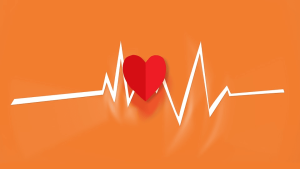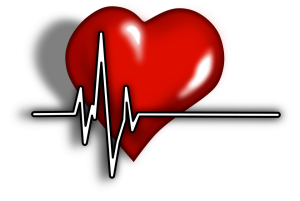Normally, your heart beats at a steady pace between about 60 to 100 beats per minute (bpm). However, in some cases, your heart may beat faster, slower, or in an irregular rhythm. This is known as heart arrhythmia.

In many cases, a heart arrhythmia is only temporary and goes away on its own. That said, you should never let a heart arrhythmia continue without seeing a doctor. When it occurs alongside heart disease, it can be dangerous and, in some cases, life-threatening.
What Is Heart Arrhythmia?
Your heart has a natural pacemaker known as the sinoatrial (SA) node. This node controls the rhythm of your heartbeats with electrical impulses.
Under normal conditions, the electrical impulses ensure your heartbeats are steady and strong at a measured pace. If you are experiencing an arrhythmia, these impulses may be too fast, too slow, or off-rhythm, which in turn affects the pace of your heartbeats.
Rapid Abnormal Rhythms
Resting heart rates over 100 bpm are considered rapid abnormal rhythms. This is known as tachycardia, and it can feel like a fluttering sensation in your chest that leaves you feeling faint, dizzy, or out of breath.
Note that to be considered tachycardia, your heart rate must be measured when you’re at rest. Having a faster heart rate during and immediately after exercise is perfectly normal. But if you are sitting on the couch without exerting yourself, a fast heart rate is abnormal, and it could be a cause for concern.
You may experience tachycardia in the atria of your heart or in the ventricles. It often weakens the pumping of your heart, which can reduce blood flow.
Slow Abnormal Rhythms
If your heart rate falls below the lower limit of a regular resting rate, 60 bpm, this is considered a slow abnormal rhythm. It is also known as bradycardia.

Like tachycardia, having a slightly slower heart rate isn’t always a bad thing. In fact, if you get a lot of exercise and you’re very physically fit, you may have a slower average heart rate. Your bpm may also fall below this level when you are sleeping or if you are taking medication for high blood pressure.
That said, if none of these conditions apply to you, persistently slow heartbeats could indicate your body isn’t getting an adequate supply of oxygenated blood. Bradycardia can also coincide with skipped heartbeats in some cases.
Irregular Rhythms
You may still have a heart arrhythmia if you don’t experience persistent slow or fast heartbeats, but instead, you feel like your heart occasionally skips a beat or beats prematurely. This is considered an irregular rhythm.
While these heart palpitations can be uncomfortable, they’re not usually serious if they occur without any other symptoms. If you have chest pain, struggle to breathe, feel dizzy or lightheaded, or you faint alongside heart palpitations, you should seek medical treatment.
One of the most common causes of irregular heartbeats is atrial fibrillation (AFib). The symptoms of AFib are shortness of breath, palpitations, or even persistent pain similar to a heart attack. Your heart rate may also be very fast, or it can be a normal rate. AFib can increase your risk of having a stroke or heart failure.
Heart Arrhythmia and Heart Disease

Heart arrhythmias can occur as an isolated event, but they’re usually more serious if they occur alongside heart disease. Conditions like diabetes and high blood pressure can lead to more severe forms of heart rhythm disturbances, as can other heart disease risk factors such as smoking and high cholesterol.
Arrhythmia and Heart Disease Treatment
Sometimes heart arrhythmias are caused by underlying initial damage to the heart, such as can be seen with early heart disease. This means that it’s very important to begin utilizing common heart disease treatment strategies like eating healthier, getting more rest, quitting smoking, and exercising more frequently as soon as possible.
Speak to your doctor about any irregularities with your heart right away. They will help you identify the problem and help you find the best treatment regimen for the problem. This may involve prescription medications and consulting a cardiologist for their expertise in treating the problem.
Certain anti-arrhythmic medications and blood thinners can help bring rapid heart rates under control. In some cases, you may need an implantable device like a pacemaker or defibrillator to reduce your risk of cardiac arrest. These devices regulate your heart rhythms by creating their own electrical impulses.
If you have extensive coronary artery blockages in addition to any arrhythmia, you may need coronary bypass surgery to restore proper blood flow to your heart and help treat the arrhythmia.
Final Thoughts
Heart palpitations and other irregularities can be benign or sometimes severe problems. It’s best to always seek advice from a doctor who can identify the underlying cause of these conditions and help you find an effective treatment plan.
